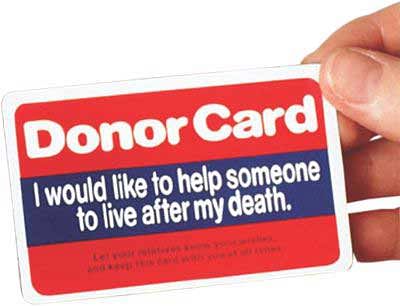Enhancing organ donation awareness

When there is a need for lifesaving organ transplant, it starts with anguish wait and rigorous search for a donor. Lying on the bed, the patient in need might harbour the excruciating pain hoping to get an organ donation from a dying person or someone living with poverty (poor enough to sell own organ). S/he might have desperate hope that someone from his/her family will make enormous personal sacrifice to donate organ.
With the improvement of transplant medicine and increasing diseases that damage organs, the need for organ transplant has increased dramatically. But there is still huge gap between the demand for organ and supply where demand drastically outstrips the number of organ donors.
There are two main types of organ donation — living-donor donation and deceased or cadaveric donation. In Bangladesh, cadaveric transplant (where organs are removed surgically from donors shortly after their death or during brain death) is yet to start. By the law of the land, organs are only removed if the deceased carried an organ donor card or if family members give permission. But, there are very few people, even in the educated segment of the society who are willing to sign a donor card. Although we claim to have better family value, most of us are unwilling to donate our organ to our near or dear ones.
Kidney transplantation is very common in Bangladesh and is done from living-donor donations. Although law does not permit selling organs or taking organ from a living stranger, media reports suggest many of the transplants are happening this way, making the transplant a questionable way out. We need to identify the effective strategy to enhance the organ donation awareness and eliminate barriers behind it.
Some countries like the USA have adopted opt-in approach where they leave the decision to people. In certain countries including Spain, Austria have tried an opt-out approach called presumed consent that says — every patient who dies is assumed to have consented to organ donation, unless they have specifically declined.
A new way to increase donations is being pioneered in Israel, that would give transplant priority to patients and their families who have agreed to donate their organs. If two patients have identical medical needs for an organ transplant, priority will be given to the patient who has signed a donor card, or whose family member has donated an organ in the past. It has shown a tremendous success taking Israel from bottom to one of the top ranked western countries where most organ donation takes place.
In Bangladesh, religious debate on organ donation is a big factor that might inhibit people to donate organ. However, most Islamic scholars agreed that saving a life supersedes most everything and organ can be donated if the only goal is to save lives. And also there is no barrier to accept organ.
In Bangladesh, strategic policy on organ donation should be accompanied by a huge public awareness campaign about organ donation countering the false perception in the society.
Millions of people die every year while awaiting for an organ transplant. Just a sign in donor card could give them a second chance at life. Help raise the awareness to save your near and dear ones.

 For all latest news, follow The Daily Star's Google News channel.
For all latest news, follow The Daily Star's Google News channel. 



Comments